
Hilda Cruz in Washington D.C. in July 2014.
With a heart full of faith and a passion for social justice, Hilda Cruz has spent the past two decades making a real difference in her community, especially for immigrants in California’s Inland Empire, becoming a familiar face in the fight for fair treatment and equal opportunities for everyone.
In 1981, when Ronald Reagan took office as President of the United States, Cruz felt a sense of optimism in the air. Many believed he would bring positive changes, especially for immigrants. “I began to pay attention because it was going to change not only my status but that of my family and many others,” Cruz said in Spanish. By 1986, the promise of an immigration reform became a reality through the Immigration Reform and Control Act (IRCA). Calls began flooding the Catholic church that Cruz used to be part of, with people eager to learn more about the reform. It was then that she decided to step up as a volunteer.
When the new law was implemented in 1986, fear gripped many. There was a widespread concern that applying for a new status might lead to deportation. Cruz immediately took the role of reassuring the community that the process was safe and backed by the Catholic Church. The church became a hub where documents were translated, and the entire process was managed, providing relief and assistance to those in need.
“For me, everything changed with the immigration reform. So many doors opened for me, but I started to see what was happening around me. I had benefited, but many people didn’t because they didn’t believe in it or didn’t know how to navigate the process,” expressed Cruz. She remembers how many people missed out on the chance to regulate their status, and soon after, the government started closing doors, coming up with new ways to criminalize people. At that moment, she decided to keep being informed about immigration policies and make it a part of her life to educate others. She reflected that by informing people, she was contributing to the greater good, helping her community stay aware and invested.
“Social justice is not just about helping the poor. It is to ask ourselves why there are so many poor people and how we will help them escape poverty,” said Cruz. In 1999, while serving as the director of social justice and outreach at St. Martin de Porres Catholic Church in Yorba Linda, she started to question the systems that keep people in poverty. For her, a key element was the lack of immigration status.
When individuals lack immigration status,the trauma they experience becomes a central and pervasive aspect of their lives. The relentless fear of being questioned about their documents or suddenly losing their jobs looms over them, creating a state of constant anxiety. Stability is a distant dream. They are ineligible for many benefits, and because of this, many continue to struggle daily. This persistent uncertainty erodes their sense of belonging, often leading to deep feelings of worthlessness.
When Cruz was 13, she landed a job at a local record shop, where the owner hired her to help tidy up. She worked tirelessly from 4 to 7 p.m. on weekdays and all day on weekends, clocking in around 30 hours a week. Her first paycheck was a mere $30, which felt unfair considering the minimum wage back then was $3.25 per hour. When Cruz shared her frustration with her mom, she responded with a poignant reminder: “Hija, you must be grateful; remember your status. Don’t question what happened; be grateful for it.” This moment was a wake-up call. “I realized then that many of us as immigrants live on gratitude. Believing that we deserve exploitation because the system does not give us a status, or better to say, does not recognize us with a status,” she said.
“People are not criminals. The systems criminalize us. So, we have to change those systems,” said Cruz. She remembers how, between 1998 and 2000, there were many changes in the immigration system. For her, it was becoming a system to keep people out. “There was a big movement in the United States where we were starting to see the creation of more prisons and increased immigration detentions,” she said. Detention centers are jails. It’s a way to incarcerate. People who have experienced jail say that immigration detention has been the worst experience. And this is what the immigration system has become. A system to criminalize immigrants.”
To change a system, it’s crucial to discuss it openly. Many people believe that immigrants who find themselves incarcerated must have done something wrong, assuming that only criminals end up in prison. Unfortunately, this view is widespread;the 2000 General Social Survey conducted by the National Opinion Research Center found that 25% of adults in the U.S. considered it “very likely” that immigrants cause higher crime rates.
On the other hand, borders weren’t always there; they were imposed, and the criminalization of once natural movements came with their creation. In 1929, Senator Coleman Livingston Blease passed an immigration act, also known asSection 1325 (U.S. Code Title 8), to "restrict Mexican immigration,” according to aHarvard Political Review article by Sarah Deonarain. The writer also explains that “the illegal crossing of the southern border by Mexicans was thus criminalized in Blease’s 1929 immigration act, and so began the conception of “Mexican criminality” in American minds.”
In 2008, while serving at the Inland Congregations United for Change in San Bernardino, Cruz had the opportunity to help connect local organizations and religious leaders to offer a quick answer to the checkpoints installed in the region and across California to ensure people weren’t drinking and driving. However, for immigrants, these checkpoints served a different purpose. Officials would stop them under the pretext of checking for DUIs, but according to Cruz, it was a tactic to identify those driving with expired licenses. Due to a new law at that time, individuals without a social security number could not renew their license. Consequently, their cars were confiscated, with no option for a family member or friend to retrieve them, leading to many detentions and inflicting immense suffering on immigrant families.
“Stories started circulating: ‘They caught so-and-so’s parents,’ and they were either deported or stuck in detention centers. It felt like a witch hunt as authorities began targeting anyone. Immigrants could no longer feel safe, not even when running a simple errand to the market, as checkpoints often popped up nearby, demanding identification. For immigrants, California turned into a terrifying place, filled with fear and uncertainty,” explained Cruz. She recalls how this system used to take people’s cars and charge them $150 per day to keep the vehicle in the impound facility, and they could not retrieve it for 30 days. “It was a big business. Where the police checkpoint was, you would see four or five tow trucks waiting to take these cars away, and with these 30-day mandates, they would leave our people with nothing.”
Cruz and the other organizations created a quick information network during this period. Anyone who spotted a checkpoint would text or call in, spreading the word about its location. For accuracy, two dedicated individuals would verify the situation, documenting everything they found. This way, everyone stayed in the loop and knew exactly what to expect on the road.

Hilda Cruz at a march in San Diego, 2018.
“We started a movement at the local level, talking to the police and explaining that these practices were inhumane and small demands were introduced to the cities,” she recalled. They opened dialogue with sheriff’s offices, involved the bishop and partnered with more organizations, ultimately halting these unjust practices in the Inland Empire region. Their efforts bore fruit on a larger scale when state laws were passed. “Now, if someone is caught driving without a license, officers are required to give them a chance to call someone to come and take the car, sparing them from harsher consequences. In that way, we helped many people,” she said.
Cruz is a woman of faith; she carries the spirit of survival and strength passed down through generations. “I come from a lineage of women who had to be strong and mature beyond their years, women who fought hard and women of faith, because it was faith that guided them forward. That was passed on to me: to work for the common good,” she shared.
Politics thrives on instilling fear. For Cruz, regardless of one’s specific beliefs—whether Christian or otherwise—anyone who believes in an all-powerful Creator should reject fear, especially fear of the “other.” She insists that faith calls people to compassion, to see and assist those in need and to challenge the harmful myths perpetuated about immigrants. The falsehoods that immigrants steal jobs, bring diseases orfail to contribute economically are simply untrue,backed by numerous statistics. “Unfortunately, these lies are often used in political games to keep people, particularly white people and now some Latinos, in a state of fear,” she explained.
Cruz is deeply committed to protecting and assisting immigrants. Her message to them is heartfelt: “I see you, I recognize you, I recognize myself in you.” She wants them to know that they belong here, in this time and place.
Currently, Cruz serves at the Interfaith Movement for Human Integrity as regional program director for the Inland Empire, collaborating with organizations like the Dignity Not Detention Coalition in the creation of events such as the “2024 Pilgrimage To End Detention,” taking place on September 25th to 29th, a visit to California’s six remaining detention centers starting in Bakersfield and finishing in San Diego, an activity that aims to raise awareness about the need to close those centers.

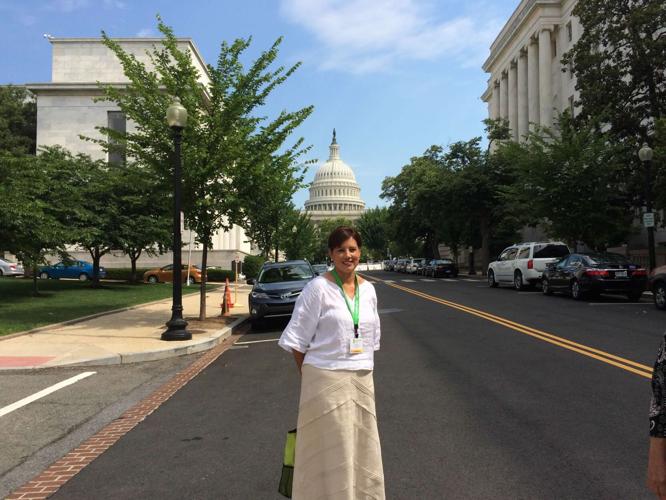
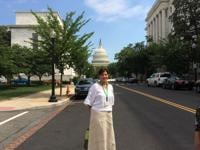
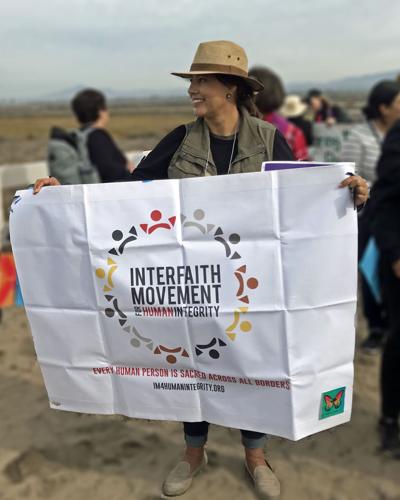
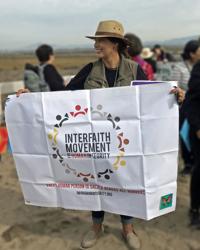





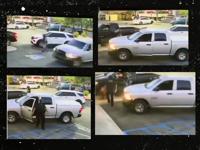

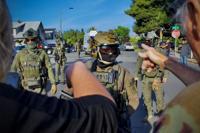
(0) comments
Welcome to the discussion.
Log In
Keep it Clean. Please avoid obscene, vulgar, lewd, racist or sexually-oriented language.
PLEASE TURN OFF YOUR CAPS LOCK.
Don't Threaten. Threats of harming another person will not be tolerated.
Be Truthful. Don't knowingly lie about anyone or anything.
Be Nice. No racism, sexism or any sort of -ism that is degrading to another person.
Be Proactive. Use the 'Report' link on each comment to let us know of abusive posts.
Share with Us. We'd love to hear eyewitness accounts, the history behind an article.